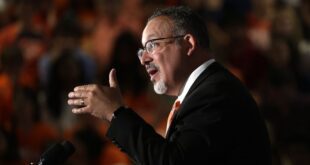Understanding the Role of School Boards in Education
With the November election a little over three months away, you’ve likely started to see school board candidate signs go up in your neighborhood and Facebook campaign pages boosted to your feed. If your neighbor or Facebook friend gets elected, what will they do? What can they do? What is the function of a school board?
School board meetings have drawn more attention in recent years as parents have become more active, joining parent rights groups, combing through curriculum, and sometimes bringing national politics into local school board discussions. During the most recent school board election, there were more candidates than Hamilton County had seen in more than two decades. The trend has been experienced in other parts of Ohio and the country, with many candidates citing pandemic policies such as mask mandates and school closures as reasons for running.
With all of this attention on school boards, and the region’s growing list of candidates, one might wonder: What do school boards actually do? The Enquirer talked with Cheryl Ryan, director of board and management services at the Ohio School Boards Association, about what school boards do and typical practices for school board members. The Ohio School Boards Association offers support and training for school board candidates during election season, and for members once they are elected.
School boards vs. school administrators: What do they do?
School board members are the “governors and guidance” of the district, Ryan said. They make and approve policies in line with education-related laws and legal requirements while working with the superintendent and other administrators. They also make sure those policies are working in a way that meets the approval of their community.
In short, the board acts as an advisor. The board does not get down into the weeds of goings-on in a school system, Ryan said, but sets standards and policies that school administrators then implement at the school and classroom levels. The board is responsible for answering “what do we want to accomplish?” Administrators are responsible for answering “how will we accomplish the goal that’s set for us by the board?”
School administrators are the real experts in education, Ryan said. They have gone through extensive schooling in best educational practices and many times have years, even decades, of experience running schools. School board members don’t always have this level of expertise. That’s why administrators often present recommendations on policy to a school board, for their approval.
How many hours do school board members typically put in?
It varies. A school board member is largely a volunteer, Ryan said. At a minimum, most school boards meet formally once or twice a month and are typically assigned to committees elsewhere in the district. Outside of those meetings, many board members attend school events “simply because they want to,” Ryan said, like football games, elementary art fairs, robotics conventions, music competitions, commencements, professional development workshops, city council meetings, and networking events.
Should school board candidates be partisan?
“One of the things I have always appreciated about Ohio school board elections is that board members are not asked to declare a political party. I believe, and many believe, that school board members should run for the board because they care about public education and they care about the students in their district who attend their schools,” Ryan said. “My opinion is that school board governance should not be political. It should be about what’s good for all students in the district.”
Is it a school board’s job to ban books or certain curriculum?
School boards are responsible for curriculum-related policies and making sure the district’s curriculum meets state standards, Ryan said. The board can also make additional requirements and offerings. For example, Ohio requires high school students to complete an Algebra 2 class by the end of their junior year. But many districts require students to complete other math classes as well in order to graduate.
But “it’s probably not routinely − at least traditionally has not been − the board’s role to approve which books are in or not in the library,” she said. Curriculum, including books, is recommended by education experts in the district − usually teachers, principals, curriculum directors, and the superintendent, Ryan said. Then the board approves those recommendations through policies. “That’s normally how it would, or should, work,” she said.
Can school boards make decisions about bathroom use, pronouns, and transgender sports?
Boards should get guidance from their legal counsels on these issues, Ryan said.
Are there any rules around school board meeting etiquette?
Ryan said there are written and unwritten codes of ethics for school board members. Every board meeting should have an agenda that board members have seen ahead of time, Ryan said. There may be last-minute additions or deletions based on hiring or other time-sensitive actions. But the goal is for board members to be prepared and to “come into meetings with an effort to be collaborative.”
It’s normal to discuss, question, debate, and even not approve the administration’s recommendations in a respectful manner. It’s important board members remember that these decisions aren’t personal, she said. The goal is to be professional at the least and cordial at best. But once a vote is taken, that is the will of the board and must be supported by each board member, even if the vote was split.
“Where we have problems is when we have board members who cannot accept that will and cannot move forward,” Ryan said. “I always say I hope that even after you have a heated debate and you take a vote, regardless of that outcome, your next conversation approaching the next vote should be done without prejudice or anger.” But it appears to be difficult for many board members to do that.
Do school board members have to give their opinion on a topic before making a vote?
No. But Ryan thinks it’s a good idea for school board members to share their thoughts on a particular vote with the community for transparency’s sake. “We always encourage board members to try and understand all perspectives to an argument” and gather as much information and data as possible before having discussion or taking a vote, Ryan said.
Do school board members have to respond to community questions?
No. School districts have various practices when it comes to responding to community members’ emails or questions. Many times it’s up to the board president only to respond to community members. Other times any board member can respond. But the association always cautions about this, Ryan said, because individual board members shouldn’t act for the board, make promises, or say a certain outcome will happen before the board has had a chance to discuss and act on an issue.
What kind of oversight do local school boards have?
It’s the community’s job to oversee its school board. “If a community is unhappy with a school board, they need to vote them out,” Ryan said.
 Mind Uncharted Explore. Discover. Learn.
Mind Uncharted Explore. Discover. Learn.



